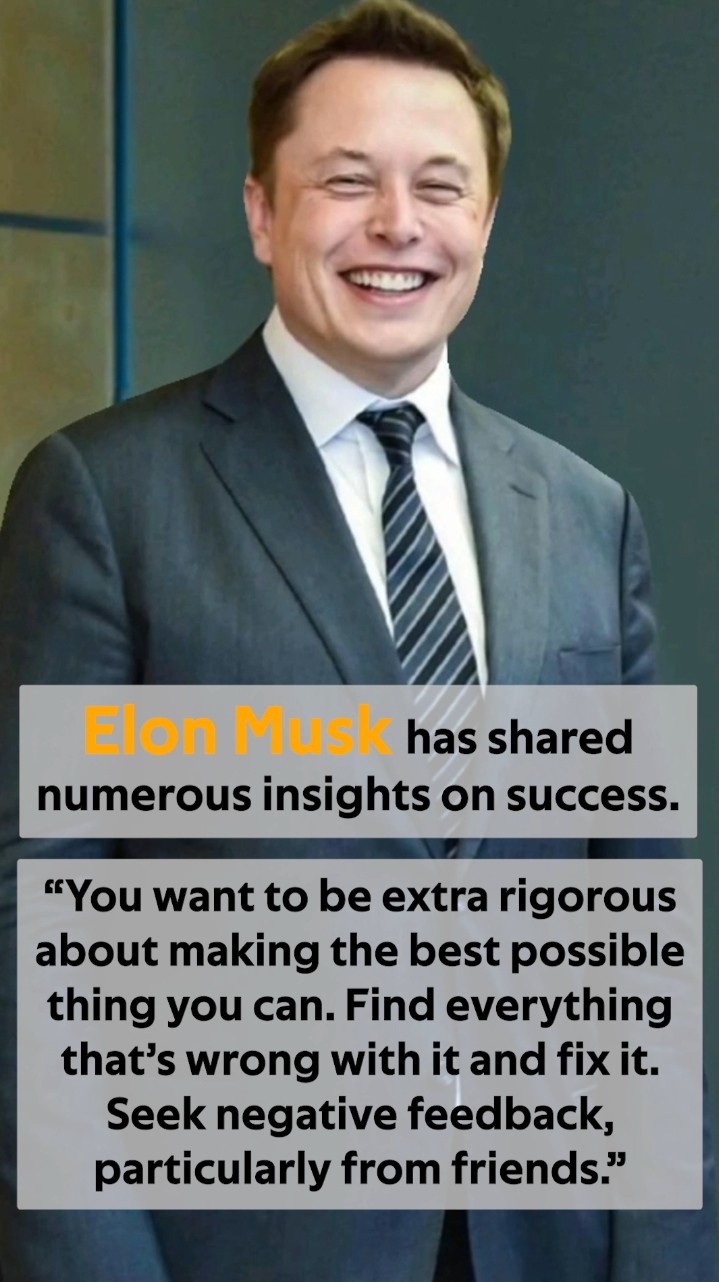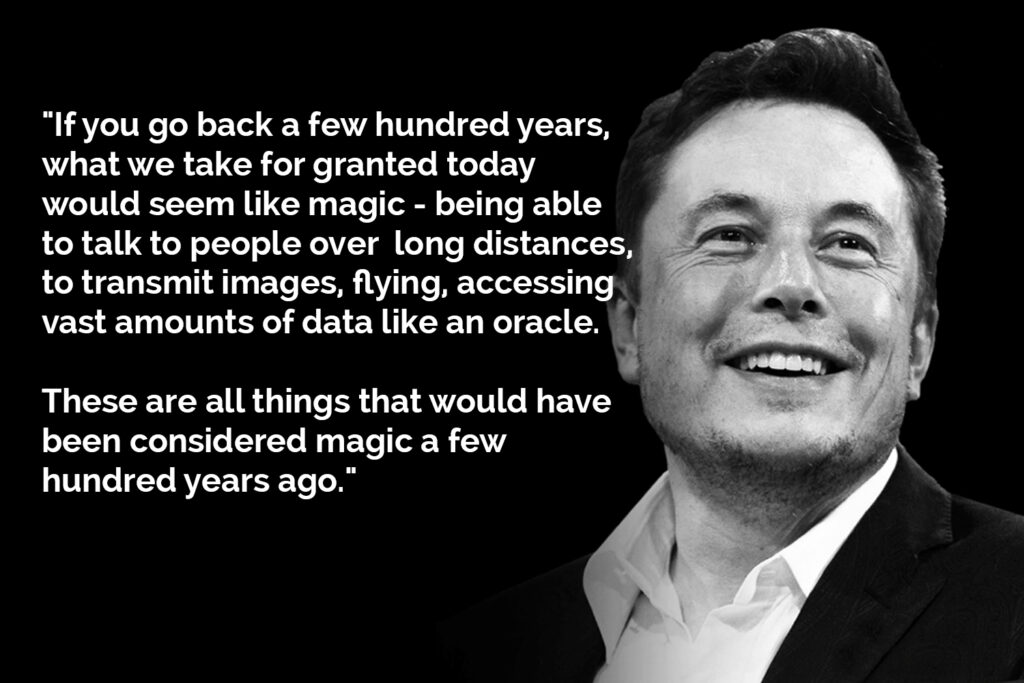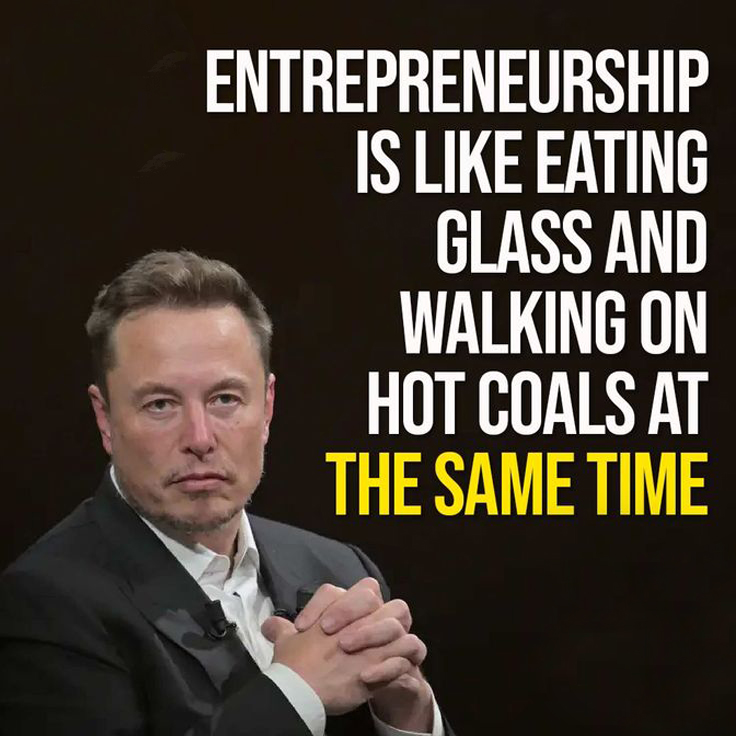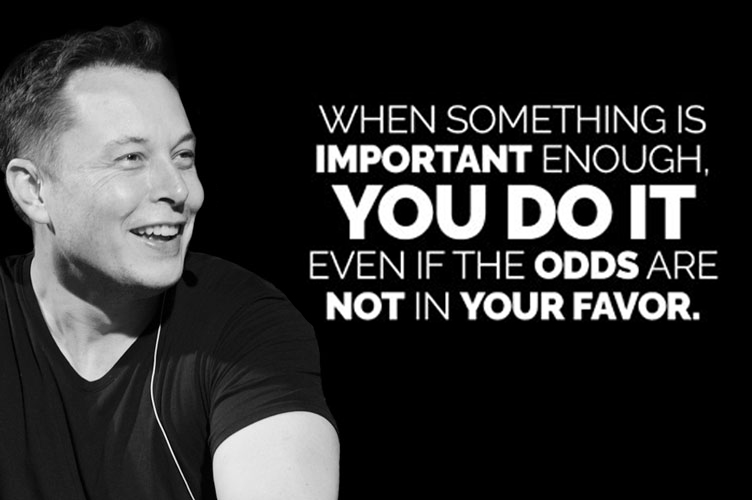
Elon Musk is the greatest and most successful entrepreneur of his generation. He’s one of only two people to have founded three billion dollar companies: PayPal, Tesla, and SpaceX; with an accumulated wealth currently of some $232 billion dollars (July 2023). More than this, he’s revolutionised industries including online payments, electric vehicles, clean energy, and space transportation. Musk is confronting some of the world’s biggest challenges head-on: from reducing global warming through sustainable energy production and consumption, to “reducing the risk of human extinction” by establishing a colony on Mars. And so far he’s winning!

Growing up in South Africa, Musk learnt engineering and computer programming at an early age, most of which he taught himself. He moved to Canada in 1989 just before he turned 18 to avoid serving in the South African military, going on to gain degrees in economics and physics from the University of Pennsylvania before dropping out of a PhD at Stanford to work on his business ideas. By 1995 he founded Zip2, an online city guide, which was acquired by Compaq in 1999 for $340 million. Musk received $22 million from the sale of Zip2, of which he subsequently invested $10 million to found an online financial services and email payment business called X.com. A year later X.com merged with Confinity which had a product at the time called PayPal. Although Musk was forced out before the sale due to disagreements about the platform and architecture of the product, Musk received $165 million in stock when PayPal was acquired by eBay for $1.5 billion in October 2002. Again, Musk invested the majority of his earnings from PayPal into his next venture, using $100 million to finance SpaceX in 2002 and launch his mission to take humankind to the stars. But he wasn’t done; in 2003 Musk decided to re-invent the automotive industry by co-founding Tesla Motors with the intention of transitioning the world over to electric cars; and in 2006 he inspired the creation of SolarCity, a solar energy company. He’s gone on to found OpenAI in December 2015, a non-profit artificial intelligence (AI) research company; Neuralink in 2016, looking to integrate the human brain with AI; and a tunnel boring company called…The Boring Company…in December 2016 (they also make flamethrowers!).

So, how does he do it? Over the years Musk has been open in sharing his thoughts, experiences, and wisdom into how he approaches business: how he thinks about innovation, product development, building a team, and launching companies. Here, from his own words, is a distillation of that wisdom to help you through your entrepreneurial journeys – these are the Elon Musk Success Principles:
Elon Musk Success Principles
1. Be Better, Not Just Different
Focus on delivering the best quality product that you possibly can that creates real value for the customer:
“Great companies are built on great products.”
“I’d say stay very focused on the quality of the product. People get really wrapped up in all sorts of esoteric notions of how to manage etc., [but] I think people should get much more focused on the product itself – how do you make the product incredibly compelling to a customer – just become maniacally focused on building it better. I think people get distracted from that.”
“You want to be extra rigorous about making best possible thing you can, find everything that’s wrong with it and fix it.”
“Focus on something that has high value to someone else, be really rigorous in making that assessment, because natural human tendency is wishful thinking, so the challenge to entrepreneurs is telling what’s the difference between really believing in your ideals and sticking to them as opposed to pursuing some unrealistic dream that doesn’t actually have merit.’’
“You shouldn’t do things just because they’re different. They need to be better.” (see the same thinking from former Apple design-guru Jonathan Ive.)
“But if you’re going to make a product, make it beautiful. Even if it doesn’t affect sales, I want it to be beautiful.”
“If you’re entering anything where there’s an existing marketplace, against large, entrenched competitors, then your product or service needs to be much better than theirs. It can’t be a little bit better, because then you put yourself in the shoes of the consumer…you’re always going to buy the trusted brand unless there’s a big difference.”
“Other advice I would give is to not blindly follow trends. Question and challenge the status quo.”
“A company only exists if they do useful things for other people… A company must be doing something significant.”
2. Focus Resources
Do your one thing exceptionally well; concentrate your energies and resources, and be clear on what NOT to do:
“If you’re in the early stages in a company, you have to focus your resources. If you diffuse them, your chances for success are much less.”
“I ask myself: Will this activity result in a better product or service? If not, I stop those efforts.”
“At Tesla, we’ve never spent any money on advertising. We’ve put all our money into R&D, engineering, design, and manufacturing to build the best car possible. When we consider spending money, we ask, ‘Will this create a better product?’ If not, we don’t proceed with spending the money.”
“It’s OK to have your eggs in one basket as long as you control what happens to that basket.”
3. Remove Barriers to Create Open Discussion
Break down hierarchies and silos to encourage open dialogue, idea sharing, and collaboration:
“We want our leaders to find ways of motivating and inspiring their teams, reduce the noise in their work and help remove blockers. If you are a manager or leading at any level at SpaceX, we stress that your team is not there to serve you. You are there to serve your team and help them do the best possible job for the company. This applies to me most of all. Leaders are also expected to work harder than those who report to them and always make sure that their needs are taken care of before yours, thus leading by example.”
Email to Tesla employees:
“There are two schools of thought about how information should flow within companies. By far the most common way is chain of command, which means that you always flow communication through your manager. The problem with this approach is that, while it serves to enhance the power of the manager, it fails to serve the company.
Instead of a problem getting solved quickly, where a person in one dept. talks to a person in another dept. and makes the right thing happen, people are forced to talk to their manager who talks to their manager who talks to the manager in the other dept. who talks to someone on his team. Then the info has to flow back the other way again. This is incredibly dumb. Any manager who allows this to happen, let alone encourages it, will soon find themselves working at another company. No kidding.

Anyone at Tesla can and should email/talk to anyone else according to what they think is the fastest way to solve a problem for the benefit of the whole company. You can talk to your manager’s manager without his permission, you can talk directly to a VP in another dept., you can talk to me, you can talk to anyone without anyone else’s permission. Moreover, you should consider yourself obligated to do so until the right thing happens. The point here is not random chitchat, but rather ensuring that we execute ultra-fast and well. We obviously cannot compete with the big car companies in size, so we must do so with intelligence and agility.
One final point is that managers should work hard to ensure that they are not creating silos within the company that create an us vs. them mentality or impede communication in any way. This is unfortunately a natural tendency and needs to be actively fought. How can it possibly help Tesla for depts. to erect barriers between themselves or see their success as relative within the company instead of collective? We are all in the same boat. Always view yourself as working for the good of the company and never your department.”
Discover more on how to create a culture of candor in your business.
4. Break Things Down and Start by Understanding the Fundamentals
Take problems back to first principles and understand the fundamentals in order to build out solutions:
“Make sure you understand the fundamental principles of what you’re trying to do before you get into the details, otherwise you could be building on faulty ground.”
“[Physics is] a good framework for thinking…boil things down to their fundamental truths and reason up from there.”
The scientific method is a phrase Musk often uses when asked how he came up with an idea, solved a problem, or chose to start a business. Here’s how he describes it:
- 1Ask a question.
- 2Gather as much evidence as possible about it.
- 3Develop axioms based on the evidence, and try to assign a probability of truth to each one.
- 4Draw a conclusion based on cogency in order to determine: Are these axioms correct, are they relevant, do they necessarily lead to this conclusion, and with what probability?
- 5Attempt to disprove the conclusion. Seek refutation from others to further help break your conclusion.
- 6If nobody can invalidate your conclusion, then you’re probably right, but you’re not certainly right.
“That’s the scientific method, it’s really helpful for figuring out the tricky things. But most people don’t use it, they engage in wishful thinking. They ignore counterarguments. They form conclusions based on what others are doing and aren’t doing. The reasoning that results is “It’s true because I said it’s true,” but not because it’s objectively true.”
“One bit of advice: it is important to view knowledge as sort of a semantic tree — make sure you understand the fundamental principles, i.e. the trunk and big branches, before you get into the leaves/details, or there is nothing for them to hang on to.”
“You can’t solve problems with the same thinking that caused them.”
See the 9 key questions to ask when defining the problems you’re trying to solve.
5. Seek Criticism and Create Feedback Loops
Actively self-analyse, and look for criticism and feedback of your thinking and ideas from others:
“You should take the approach that you’re wrong. Your goal is to be less wrong.”
“I think it’s very important to have a feedback loop, where you’re constantly thinking about what you’ve done and how you could be doing it better. I think that’s the single best piece of advice: constantly think about how you could be doing things better and questioning yourself.”
“What’s the difference between really believing in your ideals and sticking to them, versus pursuing some unrealistic dream that doesn’t really have merit? You have to be very rigorous in your self-analysis.”
“Accurate self-analysis. It’s difficult to do so, since you’re too close to yourself by definition. People do not think critically enough. People assume too many things to be true without sufficient basis in that belief, so it’s very important that people closely analyse what is supposed to be true, and build it up, analyse things by the first principles, not by analogy or convention, which is actually what most people do, that makes it difficult to gain insight as to how things can be bettered. In any argument or train of thinking, you want to make sure that the underlying premises are valid and applicable, and how the conclusion reached is necessarily driven by the underlying premises and the interconnection between those premises. It’s the foundation of rational thought.”
“A well-thought-out critique of whatever you’re doing is as valuable as gold, particularly your friends. Usually your friends know what’s wrong, but they don’t want to tell you because they don’t want to hurt you. It doesn’t mean your friends are right. But very often, they are right.”
“When I spoke with someone about the Tesla Model S, I didn’t really want to know what’s right about the car. I want to know what’s wrong about the car. When my friends get a product, I ask them to please not tell me what they like. Rather, tell me what you don’t like. And if I’ve asked that a few times of people, then they will start automatically telling me without me having to always ask the question.”
“I think it’s important for people to pay close attention to negative feedback and rather than ignore negative feedback, you have to listen to it carefully. Ignore it if the underlying reason for the negative feedback doesn’t make sense but otherwise, people should adjust their behaviour.”
“I’m not perfect at it, for sure, but I do think it’s really important to solicit negative feedback, particularly from people who have your best interest in mind.”
Uncover the power of feedback loops.
6. Failure is an Option
Accept failure, practice for it, and don’t be afraid:
“Failure is an option here. If things are not failing, you are not innovating enough.”
“If every time somebody comes up with an idea it has to be successful, you’re not gonna get people coming up with ideas.”
“People tend to over-weigh risks on a personal level. It’s one thing if you’ve got a mortgage to pay and kids to support, so that if you were to deviate from your job, well, how are you going to feed your family and pay the rent? That’s understandable, but let’s say you’re young and you’re just coming out of college, what are your risks? You’re not going to starve, certainly not in any kind of modern economy. It’s so easy to earn enough money just to live somewhere and eat food. Very easy to do. So I don’t know what they’re afraid of. Mostly afraid of failure, I think, but people should be less risk averse, when there’s not much at risk.”
“If something is important enough you should try, even if the probable outcome is failure.”
7. Hire The Best and Fire Fast
Prioritise hiring to fuel growth, but act quickly when things don’t work out. Focus on building the best possible team, and don’t compromise:
“Join a group that is amazing that you really respect, or if you are building a company you’ve got to gather great people.”
“I think you definitely don’t want to grow too fast. Make sure that every person you hire you really need to hire that person.”
“One lesson I learned [at PayPal] is to fire people faster. That sounds awful, but I think if somebody is not working out, it’s best to part ways sooner rather than later. It’s a mistake to try too hard to make something work that really couldn’t work.”
“Hire great people…this is 90 percent of the solution, as hiring wrong can cost you so much. We challenge our people leaders to hire people that are better than themselves, therefore making the company better with each hire.”
“Talent is extremely important. It’s like a sports team, the team that has the best individual player will often win, but then there’s a multiplier from how those players work together and the strategy they employ.”
“I have an exceptionally high standard for people that get hired, and especially for SpaceX. We really aspire to hire quite literally the best people in the world at their job. Finding such people is so hard…When we find them, we are generally able to attract them to the company…But the number one issue for me is finding superlatively talented people. I think we’ve been fortunate to find some very, very talented people at SpaceX, but that is always the governor on growth.”
“Starting and growing a business is as much about the innovation, drive, and determination of the people behind it as the product they sell.”
8. Work Like Hell and Don’t Be Afraid to Get Your Hands Dirty
Be prepared to put in the effort and roll your sleeves up to get the job done:
“Be very rigorous in your self-analysis, certainly be extremely tenacious, and just work like hell. Put in 80-100 hours every week. All these things improves the odds of success. If other people are putting 40 hour work weeks and you’re putting in 100 hour work weeks, even if you’re doing the same thing, you know that you will achieve in four months what it takes them a year to achieve.”
“I’d really strongly recommend someone to just focus on one company and throw as many hours at it as you possibly can. Really work morning to night. Think about it in your sleep. Seven days a week. No breaks. That’s what you should do when you are starting a company.”
“In all of the companies I’ve been involved with, there’s always been a very difficult time. It’s usually shortly after the beginning. Things seem optimistic, rosy, and exciting for the first 6 months to a year, then things start to go wrong. You encounter issues you didn’t expect, step on landmines. It’s bad…In most cases, companies go through this phase of you being in constant danger of the company dying. If you’re co-founder or CEO you have to do all kinds of tasks you might not want to do…if you don’t do your chores, the company won’t succeed…no task is too menial.”
9. Keep Trying and Have a High Pain Threshold!
Be persistent, and don’t sell yourself short:
“I think that people self-limit. The number one thing is people should just keep trying, did you try yesterday? Did you try today? It takes a lot of mental exertion to innovate.”
“Persistence is very important. You should not give up unless you are forced to give up.”
“If something is important enough, even if the odds are against you, you should still do it.”
“I think most people can learn a lot more than they think they can. They sell themselves short without trying.”
“Starting a business is not for everyone, starting a business, I’d say, number one is have a high pain threshold.”
“If you don’t mind things being really hard and high risk, then starting a company is a good idea. Otherwise, it’s probably unwise. It will certainly stress you out. So I think you have to be pretty driven to make it happen. Otherwise, you will just make yourself miserable.”


